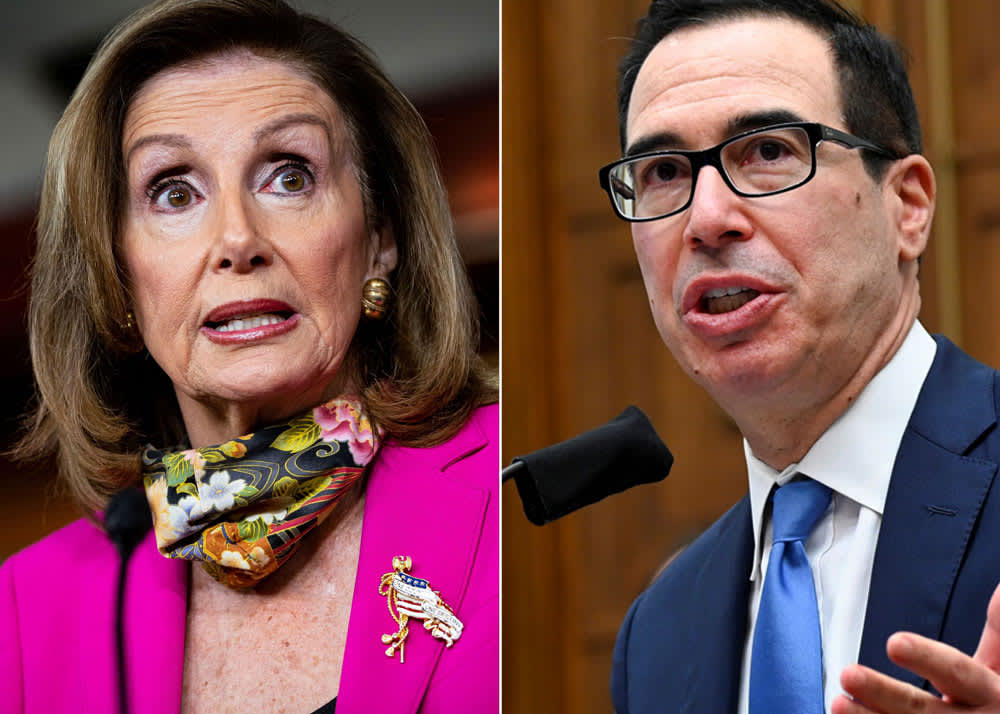House Speaker Nancy Pelosi and Treasury Secretary Steven Mnuchin spoke Wednesday morning but again did not strike a deal on coronavirus stimulus.
The pair talked by phone and had “productive” discussions about language in relief proposals delivered over the weekend, Pelosi spokesman Drew Hammill said in a tweet. He added that “one major area of disagreement continues to be that the White House lacks an understanding of the need for a national strategic testing plan” for Covid-19.
Pelosi and Mnuchin, the lead negotiators in aid talks between the White House and congressional Democrats, plan to speak again Thursday. Mnuchin said Wednesday that he and Pelosi “had a comprehensive discussion on a lot of issues.”
“We continue to make progress on certain issues, but on certain issues we continue to be far apart,” he told the Milken Institute Global Conference.
Nancy Pelosi and Steven Mnuchin
Reuters
The Treasury secretary, who over the weekend urged Congress to allow businesses to access a second Paycheck Protection Program loan from $130 billion in unused funds, said the “all or nothing approach” on legislation “doesn’t make sense.” Even as he called for immediate, “targeted” aid, Mnuchin conceded that “getting something done before the election and executing on that would be difficult.”
The negotiators have made a last-ditch push to reach a stimulus agreement before the 2020 election. But the chances of Congress passing new aid before Nov. 3 have slimmed as the Republican-held Senate pushes to vote on a more narrow plan than either the White House or Democrats have proposed.
While Trump earlier this month scrapped talks until after the election, he reversed course as he faces a difficult bid for a second term in the White House. Pelosi, whose party passed a $2.2 trillion relief bill in the House, has dismissed the White House’s latest $1.8 trillion proposal as inadequate.
Congress has not passed new relief funds in months as the coronavirus spreads throughout the country and millions of Americans remain unemployed after shutdowns designed to slow the outbreak.
While the overall cost of the Trump administration plan is similar to the price tag of the Democratic bill, major disputes remain unresolved. Democrats have proposed $436 billion in aid for state and local governments that could have to cut essential services as they face increased costs and lower revenue during the pandemic. Mnuchin offered $300 billion for states and municipalities.
Trump, who signed off on his administration’s proposal, again railed against state and local aid on Wednesday. He said he wants to “see the Democrats loosen up a little bit” because “all they want to do is bail out their badly run cities and states.”
The bipartisan National Governors Association has repeatedly asked Congress for $500 billion more in relief. Mnuchin on Wednesday noted that governments laying off employees like firefighters “would have a cost to the federal government in unemployment, but also a cost to the economy.”
The Democrats’ bill also reinstates the $600 per week enhanced federal unemployment insurance through January. The White House proposal would establish a $400 weekly benefit through the third week of January.
Pelosi has faced some pressure within her caucus to either address issues like unemployment insurance in a stand-alone bill or accept a smaller deal from the White House. In a tense interview on CNN on Tuesday night, the California Democrat said members who have criticized her strategy “have no idea about the particulars” of the talks.
Senate Majority Mitch McConnell, meanwhile, has seen criticism for the Senate’s decision to move forward with Amy Coney Barrett’s Supreme Court nomination as jobless Americans await relief. When he announced the Senate’s plans to vote on a limited bill after the chamber returns on Monday, he said lawmakers would have enough time to pass the aid legislation and confirm Barrett before the election.
A lack of new relief could also hurt vulnerable Republican incumbents as the GOP looks to hold its 53-47 Senate majority on Election Day.
Even if Pelosi and Mnuchin can reach an agreement that would earn Democratic votes and Trump’s signature, they could have a difficult time persuading the Senate GOP to support it.
